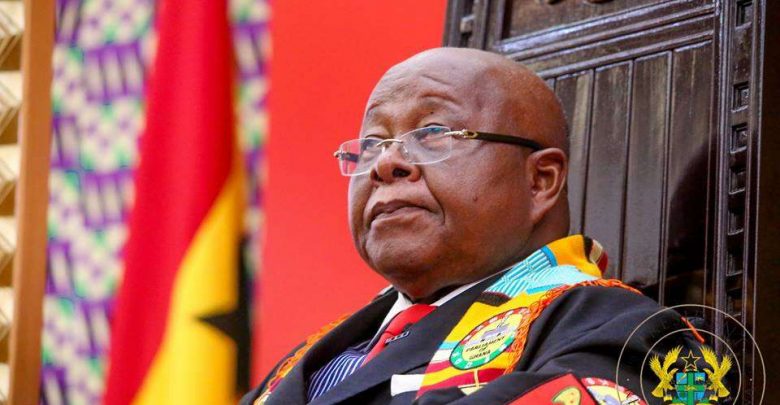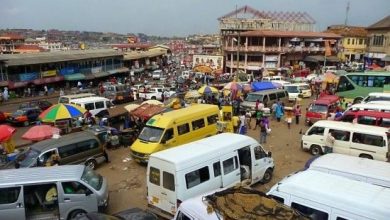Life StyleNews
Search for next Speaker: NPP Council endorses Prof Oquaye

The National Council of the New Patriotic Party (NPP) has unanimously nominated Professor Aaron Michael Oquaye for the position of Speaker of Parliament for the second consecutive time.
If he gets the approval of the Eighth Parliament, Prof. Oquaye, who is a three-time Member of Parliament (MP) for Dome Kwabenya, will become the second Speaker, after the late Justice Daniel Francis Annan, to serve two terms as Speaker of Parliament.
Yesterday’s council meeting at the Alisa Hotel in Accra was attended by President Nana Addo Dankwa Akufo-Addo; the Vice-President, Dr Mahamudu Bawumia; the Chief of Staff, Mrs Akosua Frema Osei Opare; the Chairman of the Council of Elders, Mr Hackman Owusu Agyeman, and the National Chairman of the party, Mr Freddie Blay.
The members deliberated and decided on a number of names submitted to it by the National Steering Committee of the party for the leadership of its side of the Eighth Parliament.
The council also settled on Mr Osei Kyei-Mensah-Bonsu, the Member of Parliament (MP) for Suame, as the Majority Leader, for the second time running, with the three-time MP for Effutu, Mr Alex Afenyo Markins, being pencilled in as the Deputy Majority Leader.
Others are Mr Frank Annor Dompreh, the re-elected MP for Nsawam-Adoagyiri, Chief Whip; Ms Lydia Seyram Alhassan, the MP for Ayawaso West Wuogon, Deputy Chief Whip, to be assisted by the first-time MP-elect for Tolon, Mr Habib Iddrisu.
Article 14 (2) of the NPP Constitution mandates the National Council of the party to elect the leadership of the parliamentary group of the party.
The council received recommendations from the National Steering Committee and thoroughly discussed them before taking the decisions.
Elections
The positions of Speaker, First Deputy Speaker and Second Deputy Speaker will be nominated on the floor of the House after the MPs-elect have been duly sworn in.
Consistency
When the Daily Graphic reached him for comment, Prof. Oquaye expressed excitement at the news and thanked the council for the confidence reposed in him.
Addressing the media after the closed-door meeting, the General Secretary of the NPP, Mr John Boadu, said the President and the council resolved that considering the slim divide of the Eighth Parliament, the party would need consistency and avoid the creation of friction.
He recounted the incident in 2004 when the then Speaker from 2001, Mr Peter Ala Adjetey, was changed, even with a greater majority on the side of the NPP in Parliament, saying it was not good to repeat that brouhaha that engulfed that selection.
Mr Boadu said the discussions, the nominations and the acceptance took place in tranquillity, without any intimidation and with most of the nominations receiving thunderous applause.
Rich profile
Prof. Oquaye is an accomplished diplomat, legislator, politician, academician and religious leader.
On the diplomatic landscape, he served as Ghana’s High Commissioner to India (2002-2004).
As a politician and legislator, he served as the MP for Dome Kwabenya from 2005 to 2013, Minister of Energy from 2005 to 2006, Minister of Communications from 2006 to 2007 and Second Deputy Speaker of the Fifth Parliament from 2009 to 2013.
Engagements.
To address the needs of the vulnerable, Prof. Oquaye initiated the use of sign language interpretation in Parliament for the benefit of persons with hearing impairment.
For the first time in the history of Parliament, he led the House to adopt a motion for the enactment of Private Member’s Bill on Thursday, July 16, 2020, a bill which allows members of the House, other than the Executive, to sponsor bills for passage into laws.
Under the Speakership of Prof. Oquaye, seven Private Members’ bills have been worked on, with two of them laid before the House, out of which one has been passed.
They include the Criminal Offences (Amendment) Bill, 2020; the Public Health (Amendment) Bill, 2020; the Road Traffic (Amendment) Bill, 2020; the Public Order (Amendment) Bill; the Electoral Offences and Related Malpractices Bill; the Budget Bill; the Reproductive Assisted Technologies Bill and the Physical Infrastructure Enhancement Projects.
Parliament passed the Road Traffic (Amendment) Bill, 2020, the first Private Member’s Bill, on December 20, 2020.
Physical infrastructure
Parliament has steadily seen various phases of its physical infrastructure, including enhancement projects such as the construction of the Tower Block Annex (Job 600 Annex), the Visitors’ Waiting Centre, Drivers’ Waiting Centre and the Chamber Support Services Block and extension works championed by Prof. Oquaye.
He also spearheaded the facelift of the existing Parliamentary Chamber to create and expand the Tower Block (Job 600) facility to accommodate the offices for all MPs and the revamping of the Parliamentary Training Institute (PTI).
Source: Graphic.com.gh



